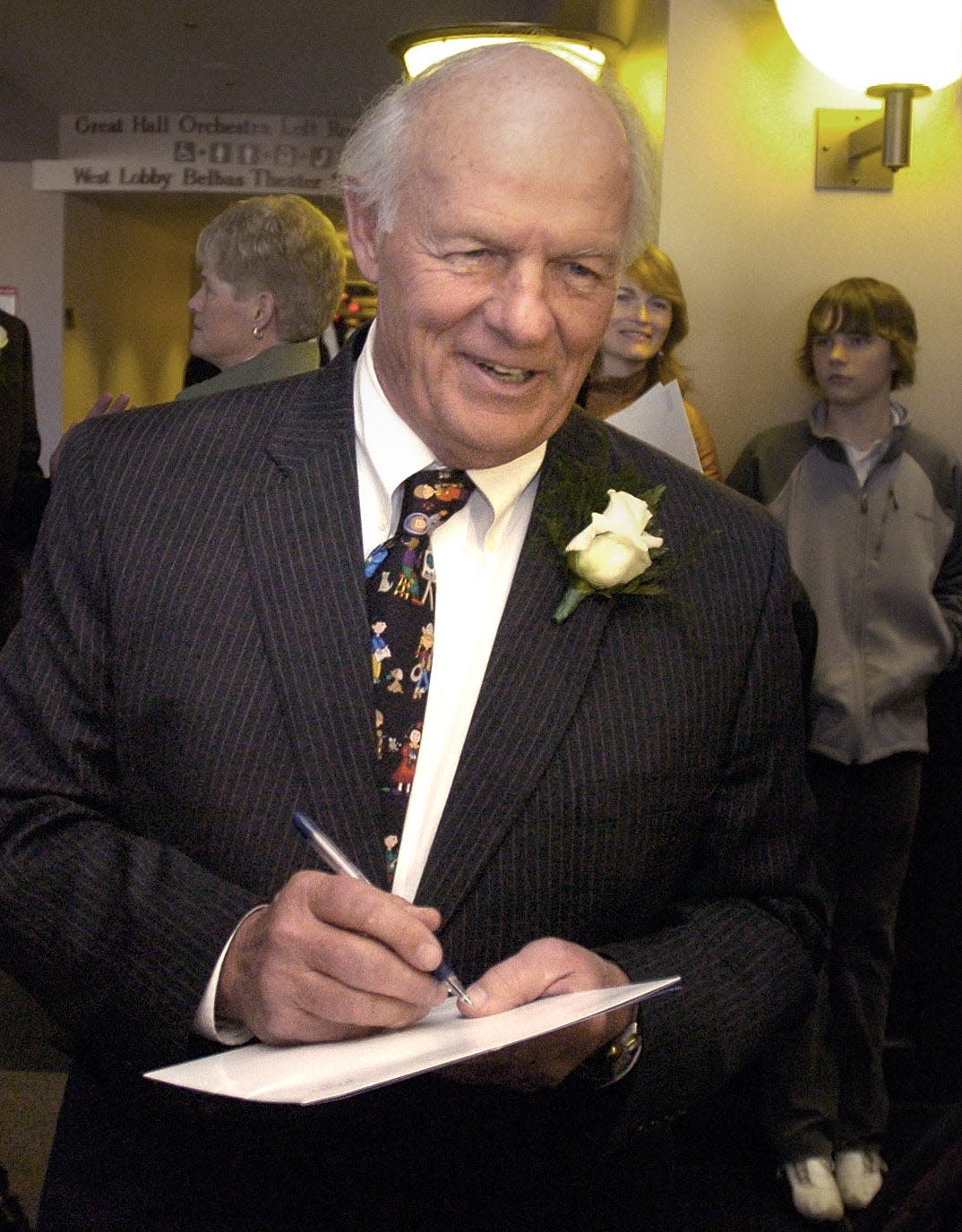Why unsealing the Denny Sanford documents is important for the public's right to know

It was revealed Thursday, after a nearly two-year legal battle, that billionaire banker T. Denny Sanford possibly had several images depicting child pornography in an AOL email address registered to him.
The document drop was part of five search warrant affidavits filed between December 2019 and March 2020 by a South Dakota Department of Criminal Investigation special agent investigating Sanford for possession and distribution of child pornography.
The images appear to be five unique pictures of five young girls between the ages of 8 and 15. Three of those images were repeated several times. Overall, he allegedly had a total of 36 images, the affidavits state. Each girl is naked, facing the camera, with one photo appearing to be of a screen. Two emails, which contained some of the images, were sent from a Verizon Samsung Galaxy smartphone.
More: Search warrant affidavits into T. Denny Sanford have been unsealed. Here's what we know
The emails were sent on May 28, 2019, May 29, 2019 and June 27, 2019.
Sanford’s lawyers have argued that the founder of Premier Bank and namesake of the Sanford Health System had been hacked, leading to the investigation. In a statement Thursday, attorney Stacy Hegge said Sanford appreciated the thorough investigation by law enforcement that had determined there were no prosecutable offenses.
"These preliminary allegations were provided to law enforcement prior to law enforcement’s exhaustive investigation and its realization that various individuals had documented access to the electronic devices at issue, including signs of hacking," Hegge said. "While some claim releasing affidavits that reiterate these allegations constitute transparency, releasing preliminary allegations made prior to completing the full investigation only misinforms people and obscures the investigation’s conclusions that no prosecutable offense occurred.”
The investigation into Sanford by DCI was concluded in May 2022 with the Attorney General’s Office determining there were no prosecutable charges. It’s unknown if other jurisdictions are currently investigating Sanford in similar cases.

How did we get here?
The South Dakota Supreme Court ruled on April 6th that the search warrant affidavits had to be released, concluding two years of litigation between Sanford, the Argus Leader and ProPublica, a nonprofit investigative outlet.
The Argus Leader had first learned about the search warrants, part of a child pornography investigation, in 2020 when Sanford was only referred to as the “Implicated Individual.” At the time, the search warrants and the affidavits were under seal, when normally under state law, those are public records.
More: Why South Dakota billionaire T. Denny Sanford has never been charged in 2019 child porn case
It’s the second time the Supreme Court has had to make a ruling on the Sanford case. Justices ruled in favor of the Argus Leader and ProPublica in 2021 that some of the items in the search warrants are public information.
What does this mean for the public?
Jennifer Nelson, a senior staff attorney for the Reporters Committee for Freedom of the Press, a nonprofit organization that provides free legal services for reporters, said any time a court rules that information must be public, it builds trust.
“Any time if you're thinking about things happening in secret behind closed doors, that's where abuses could occur,” she told the Argus Leader on April 18. “Public oversight of the judicial system is just incredibly important.”
Nelson added in cases where search warrant affidavits are available, even after the conclusion of an investigation, that material provides the public an explanation as to why that search was justified.
More: What happened during the child porn investigation tied to T. Denny Sanford in South Dakota
In Sanford’s case, although no criminal charges were ever filed by the South Dakota Attorney General's Office, Nelson said the search warrants and affidavits should have been presumed to be public unless there was a legitimate reason for the sealing.
“It shouldn’t take three years of litigation to get access to material like that,” she said.
Prior to the Supreme Court ruling, a Minnehaha County circuit judge was set to release the affidavits with his own redactions. However, Sanford’s lawyers argued the material should stay sealed until they had time to review it in case any confidential information, such as trade secrets or personal identifying information, were included.
Personal identifying information, such as phone numbers, names of victims and addresses, is typically redacted in search warrant affidavits.
More: Supreme Court: T. Denny Sanford search warrant affidavits in child porn case must be unsealed
Nelson took issue with Sanford's argument, saying the "might be" claim wasn’t strong enough ground to fully seal the document.
“Judges are provided with that discretion for good reason,” she said. “Withholding a document in the entirety is not the answer in these circumstances.”
Overall, by releasing the Sanford affidavits, it shows that powerful people can be held to account, not just in South Dakota but also across the county.
“I think that this material should be publicly accessible including when it is a famous or powerful individual whose information is at stake here. I think it’s incredibly important,” Nelson said.
This article originally appeared on Sioux Falls Argus Leader: Unsealing Denny Sanford documents key to public's right to know

